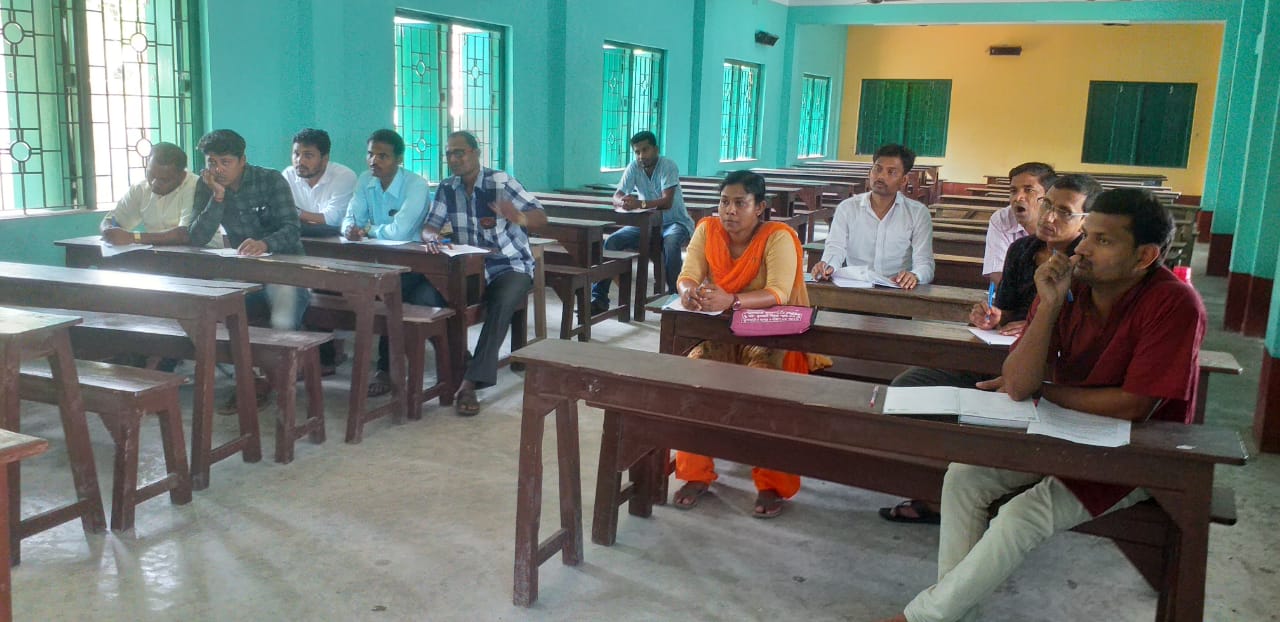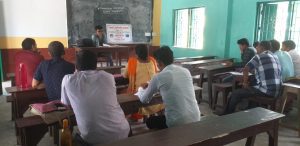

Value Education Training for MSS Teachers of Sagar Block
Mukti focuses on imparting Values Education to the teachers of Mukti Support Schools (MSS) as teachers can inculcate inculcating strong personal, social, universal and spiritual values to their students and contribute to nation-building. Mukti has planned to conduct 11 such value education sessions in the future in different districts of West Bengal.
Mukti with the training partner “Vivek Pothe” organized the first training session at Sagar block of South 24 Parganas district on 16th April 2023. On behalf of “Vivek Pothe” the trainer Mr. Anup Pariya conducted the training. 14 MSS teachers of the Sagar block attended the training session.

The topic of the first module was – “Inclusion of participatory process in the education system”. The module was divided into 5 parts.
In the introductory part, the teachers who are willing to speak are asked to list one by one what methods of education are adopted in the current school teaching system or in Mukti Support School. (For example – what other similar methods do the teachers adopt such as teaching a subject one day and then taking a test in the next day?)
At the beginning of the second part, the teachers presented in the session were asked to share their opinion on what is the participatory process. Their opinions were listed thereafter.
While briefly explaining what participatory process is, it is said that the first step of participatory process is to know the opinion of the participating members about the particular topic being discussed and to identify the skills, qualifications, position, and experience of each member by encouraging each of them to take an active role in the discussion. This process helps to develop a deep and useful understanding of different members’ ideas, thoughts, perspectives, topics of discussion, and objects. Participatory processes are not only about the discussion – they can be used in teaching, decision-making, taking initiative, and finding solutions to problems.
In the first process, only the willing members got the opportunity and those who were silent due to various reasons (shyness, fear, inertia etc.) participated passively in the process. But in the second part of the exercise, everyone participates and gets a chance to express their opinions, and this opportunity helps create a discussion leader.
The third part of the session was on discussing the principle of the participatory process. Participatory processes have certain principles which, if not followed, can immediately turn the process into an individual process. So what needs to be kept in mind while adopting this process are as follows –
- The process manager will give everyone a chance to speak
- The discussion space should be safe so that every member can express his opinion without hesitation
- All views emerging from the discussion should be given equal weight and respect. No opinion can be judged.
- After expressing everyone’s opinion, the moderator will express his opinion on that specific issue.
- No one can be influenced in giving an opinion.
- If there is any kind of power relationship between the moderator and other members or between members (for example, a teacher-student relationship, the relationship between superior authority in the workplace and worker), this process must be done with great awareness because the exercise of power, whether direct or indirect, involves the process and participation then the process will no longer be a substantive process.
- While doing this process with both male and female students, both should be given equal opportunity.
- Time management is a difficult aspect of the participatory process, so every participant has a role to play in managing it.
- If a participant is extremely hesitant to express an opinion or requests not to be asked, those members should respect his decision and cooperate in participating according to his convenience.
The discussion of the fourth phase was the importance or need of including this process in the current education system. Through group exercises all members are divided into small groups of 5 and were told to conduct a discussion and at the end of the discussion to present it in front of everyone.
Some of the possible benefits are mentioned below–
- Establishing a good relationship between teachers and students
- Making the learning process more enjoyable
- Building confidence in all kinds of students.
- Make it a habit to respect everyone’s opinion or point of view.
- To develop more interest in the subject matter.
- Help to understand every student’s perspective, interest in a particular subject, and latent potential in him.
In the fifth phase, through an open session, teachers were explained how to apply this process in their own teaching areas or what kind of obstacles may arise in applying this process (the trainer listed possible obstacles).
The session was concluded after collecting feedback about this training phase.
Project Activities
- About Mukti (2)
- Accreditation (31)
- AGM (63)
- Agriculture Reforms (16)
- ahm2017 (4)
- ahm2017news (2)
- ahm2017runners (2)
- ahm2018runners (1)
- Ambulance Service (2)
- Amplifying Community Voices (9)
- Awards (22)
- Awareness and Empowerment (13)
- Awareness drives (1)
- Book-Bank (13)
- Careers (8)
- CARR (32)
- Ccp1011 (4)
- Chick Rearing Programme for Marginalised Women (5)
- Climate Resilience River Embankment (1)
- Coaching Center (102)
- Community Clinic (2)
- COVID19 (62)
- Cyclone Amphan Relief and Rehabilitation (129)
- Cyclone Bulbul Relief (30)
- Cyclone Relif (2)
- Cyclone Yaas Relief and Rehabilitation (68)
- Editorial (21)
- Editorial by Abir Biswas (1)
- Editorial by Ankita Kothiyal (1)
- Editorial by Kasturi Bakshi (1)
- Editorial by Prof. Pradeep Ray (1)
- Editorial by Ranitendranath Tagore (1)
- Editorial by Sankar Halder (10)
- Editorial by Satyajit Ray (3)
- Editorial by Sohini Mehta (1)
- Editorial by Soumitra Bose (1)
- Editorial by Subhankar Basu (1)
- Education and Enrichment (34)
- Environment and Resilience (9)
- Essential Items Distribution (19)
- Fair/Exibition (1)
- Featured Activities (10)
- Go Green (81)
- Gram Clinic (2)
- Green (20)
- Health (8)
- Health Water & Sanitation (17)
- Hello Beta (1)
- Impact Stories List (31)
- Integrated Development (11)
- Jal hi Kal (2)
- Kerala Flood Relief (3)
- Kitchen Gardening (2)
- Livelihood & Enablement (20)
- Marathon (13)
- MCDF (14)
- Mcdf (112)
- Mcom (6)
- Medical Camp (8)
- MIT (3)
- MKSS (6)
- MSS (11)
- MUKTI Community Shop (1)
- Mukti Craft (2)
- Mukti Cultural (1)
- Mukti Employment (2)
- Mukti Fresh (2)
- Mukti Gram - Egra (2)
- Mukti Gram - Purbashridharpur (8)
- Mukti Gram, Model Village (136)
- Mukti Green (6)
- MUKTI Institute of Technology (MIT) (3)
- Mukti Kishalaya (2)
- Mukti Support (1)
- Mukto Dhara (1)
- NaRKEL (9)
- Obituaries (4)
- Observance Days Celebration (10)
- Organic Farming (3)
- Organic Farming & Training Support (8)
- Pandemic Support (2)
- Pond Rejuvenation (1)
- Prerana (4)
- Projects For Mukti Wide (3)
- Rights and Special Needs (19)
- Riste (2)
- RTI (14)
- Sahosini (3)
- SAM (9)
- Sam (89)
- SDF (9)
- Skill & Enterprise Development (2)
- Skill Enterprise (2)
- star-of-the-week (9)
- STEP (1)
- Success Stories (39)
- Success Story Coaching Center (1)
- Success Story MCDF (6)
- Success Story RTI (1)
- Success Story SAM (9)
- Success Story TSS (20)
- Sundarbans Green (SUN-G) (1)
- Sunderban development fair project (7)
- Sustainable Agriculture (2)
- SWAS (2)
- SwasthoSongini (4)
- Swavlamban Accelerator in Sundarbans (SWAS) (2)
- Talented (2)
- Tour for Cause (31)
- TSK25 2017 (7)
- TSK25 2017 Runners (7)
- TSS (17)
- TSS (112)
- Uncategorized (59)
- Valued Partners (3)
- Vclpk (1)
- Vetp (2)
- View (2)
- VOICE (2)
- workshop (109)